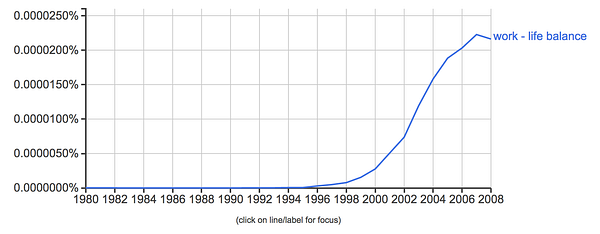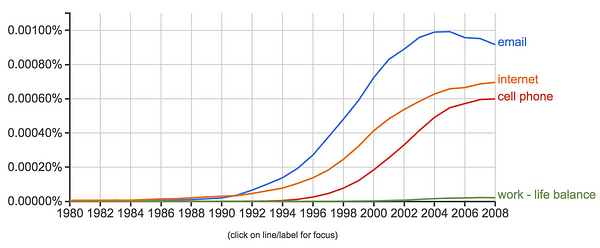It seems like we’re all struggling to achieve “work-life balance.” Our inboxes are invading our evenings and our work is overwhelming our weekends. Only 39% of Americans use all of their vacation time. 6 in 7 children see their parents bringing their work stress home. A third of couples argue over balancing the time needed for work versus quality time together.

We can figure out how to conquer this crisis by exploring its beginnings. The Google Ngram Viewer is a tool that graphs the frequency of words and phrases used in books across time. It is a useful way to track how certain trends have come and gone over time. As you can see in the Ngram for “work-life balance,” the phrase came into use in the mid-1990s, had inflected upwards by the new millennium, and rocketed up through the 2000s. We are not wrong to think that this crisis of balance is specific to our time.

Ngrams get interesting when you layer on other trends. A few years before the rise of the “work-life balance” crisis comes similar trend lines for the rise of information technology: “cell phone” “email” and “internet” all came into use in the early 1990s, had inflected upwards by the end of the ‘90s, and rocketed up in the new millennium. The “work-life balance” crisis appears to be an aftershock of the digital earthquake.
The internet has not only caused the walls between work and life to come crashing down: it has also hurt our ability to work while we are at the office.
Between the late 1990s and the late 2000s, office distractions doubled from six per hour to twelve per hour. Research have shown that the typical office worker is interrupted or forced to switch tasks every three minutes and five seconds — and, worse, that these interruptions take 23 minutes and 15 seconds to recover from. According to a study done at King’s College, London,being constantly distracted by email and text messages at work causes over twice the loss of cognitive function as smoking pot before work.
We could call this phenomenon “The Great Spillover.” Whereas our production (focused work), our coordination (interaction with others about work), and our leisure (not work) used to be relatively contained, they now spill over onto each other. We coordinate and have leisure during production hours (think: having a co-worker pop in to chat or catch yourself watching videos when you should be planning a project). We produce and have leisure during coordination hours (think: precious meeting time spent thinking about questions for the first time or in distracted chit-chat instead of efficiently discussing proposals prepared beforehand). And worst of all, we coordinateand produce during leisure hours (think: emailing during dinner or doing conference calls on vacation).
As we let The Great Spillover happen to us, we think we are squeezing more out of our days: more emails, more fun videos, more updates, more connection, more progress on our projects. But in reality, we are struggling with everything. The Great Spillover makes us bad at production, because we never have sustained, uninterrupted time for deep thought and deep work. It makes us bad at coordination, because we never give people or topics our full attention and start to negatively view co-workers as “the people that interrupt my production and leisure.” And finally, it makes us bad at leisure, because we never have a chance to truly escape and rejuvenate. Forget work-life balance: The Great Spillover is ruining both work and life.
To save work and life in the internet age, we need to combat The Great Spillover by again separating, optimizing and balancing production, coordination, and leisure.
Most importantly, we need to fortify our leisure — nights, weekends and vacations — against the invasion of work and technology. 1 in 5 Americans say they “never fully relax” on vacation. That’s why we need to make sure we find time for technology-free leisure that truly gets us away from our daily routines. We must do more than just take time off: we must mindfully get away from our daily grind so can we achieve that outside, holistic perspective on our daily lives that deep rest can bring. This not only leads to joy duringour leisure time: it also helps us do better during work hours. Research has shown that people are more motivated to achieve their work goals after a vacation.
Second, we need to fortify our production — hours for deep focus and work — against interruptions by co-workers and other commitments. As famed psychologist Mihaly Csikszentmihalyi has shown, our “optimal experience” — what he calls flow — only comes when we are uninterrupted and fully immersed in energized focus and full involvement in an activity. The writer Cal Newport calls it “Deep Work,” the distraction-free concentration that “push[es] your cognitive capabilities to their limit,” which he contrasts to the “Shallow Work” of “noncognitively demanding, logistical-style tasks” that are performed while distracted and “tend not to create much new value in the world.” To achieve states of flow and Deep Work more often, we need to proactively schedule days uninterrupted by meetings and hours uninterrupted by emails or co-workers. In addition to granting vacation days, employers need to grant “production days,” where we are empowered to spend the entire day immersed in deep work to make serious progress on a project.
If we fortify deep leisure and deep production against interruption, our coordination will become healthier. When emails, meetings, and co-worker questions are cordoned off into specific parts of the day, we can give our full attention to them, rather than having them compete with our leisure and production. We cease to associate each other with the negative feelings of being interrupted. We move away from triaging each other’s needs and towards deeply engaging with each other’s needs.
Indeed, by separating production, coordination and leisure, we can save them from each other and achieve the balance needed to thrive in our over-connected age.
Originally published on Thrive Global.
